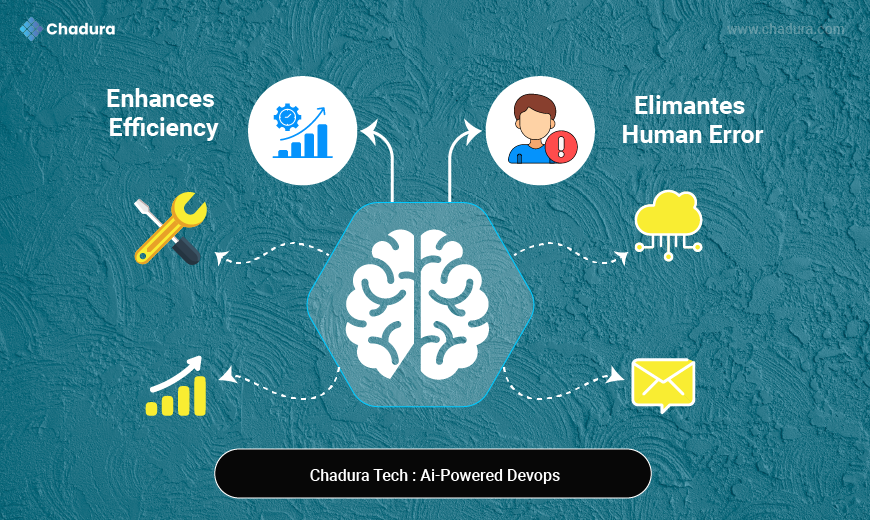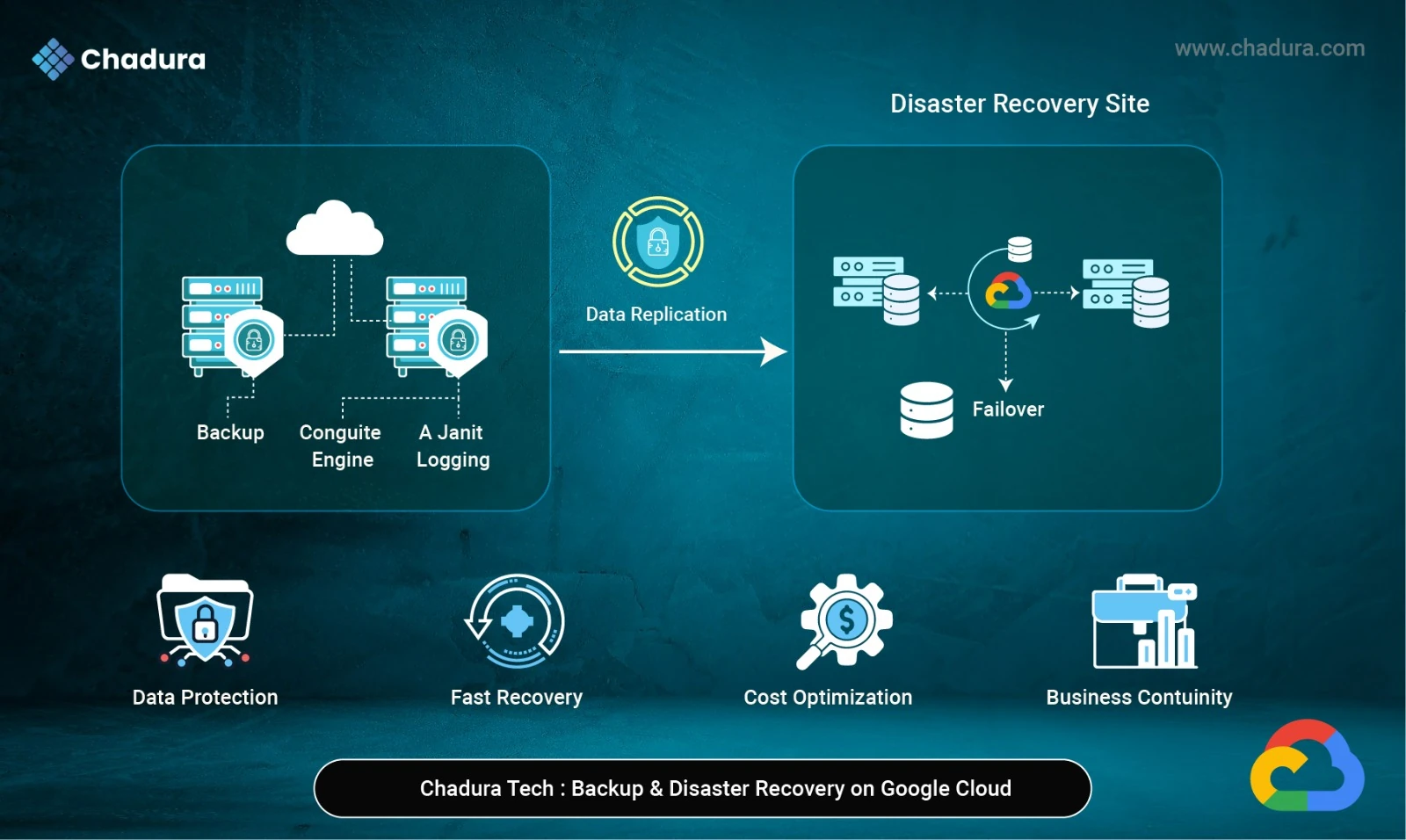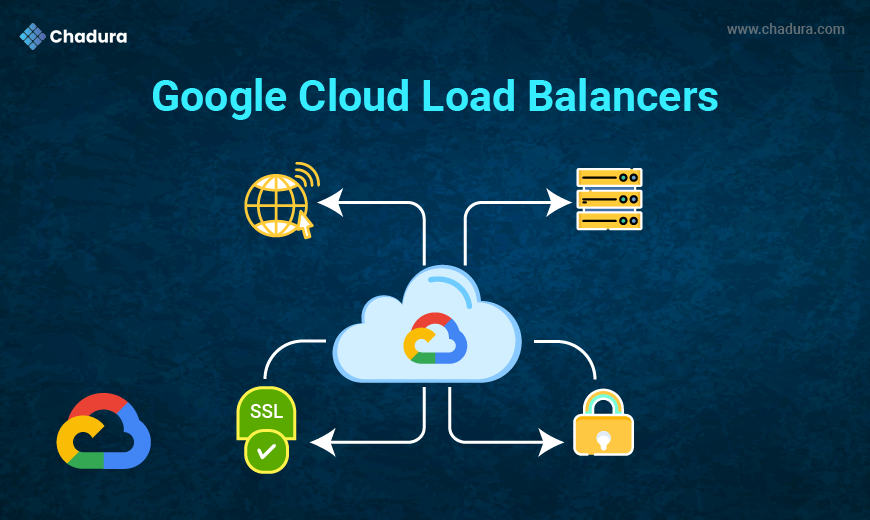1. The Changing Face of DevOps
The world of DevOps is transforming rapidly. What started as a cultural and operational movement to unify development and operations has now evolved into an intelligent ecosystem. Artificial Intelligence (AI) is at the forefront of this transformation — bringing automation, predictive insights, and enhanced reliability into every stage of software delivery.
At Chadura Tech, we believe that AI is not just an add-on to DevOps; it’s becoming the backbone of modern software pipelines. By integrating AI-driven tools into CI/CD workflows, monitoring, and infrastructure management, organizations can significantly reduce human error, accelerate delivery, and increase operational efficiency.
2. Understanding the Role of AI in DevOps
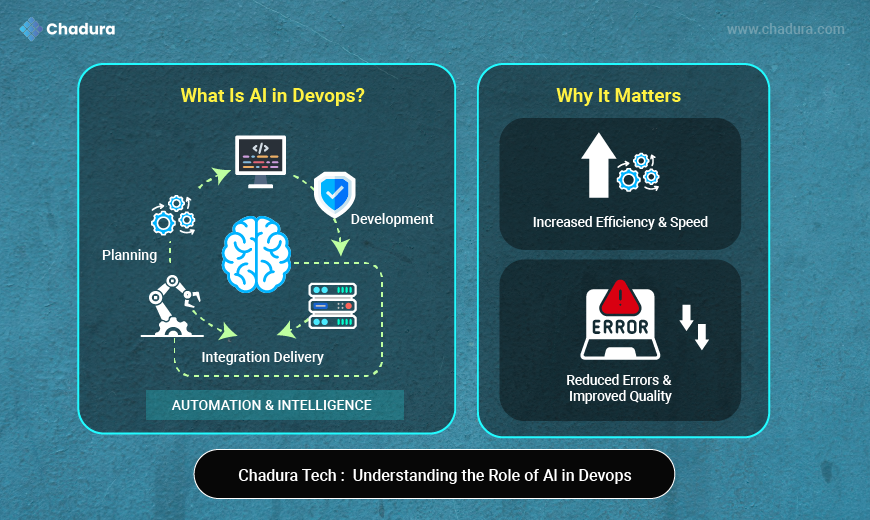
2.1 What Is AI in DevOps?
AI in DevOps refers to the integration of machine learning models, predictive analytics, and automation algorithms into the DevOps lifecycle. These systems analyze historical data, detect anomalies, optimize pipelines, and even make proactive decisions to maintain uptime and performance.
2.2 Why It Matters
Traditional DevOps relies heavily on manual intervention — from writing deployment scripts to monitoring infrastructure. As systems scale, human dependency introduces risks such as:
- Configuration mistakes
- Overlooked errors during deployment
- Delayed incident response
AI addresses these challenges by learning from data patterns and automating repetitive or error-prone tasks.
3. The Problem: Human Error in DevOps Pipelines
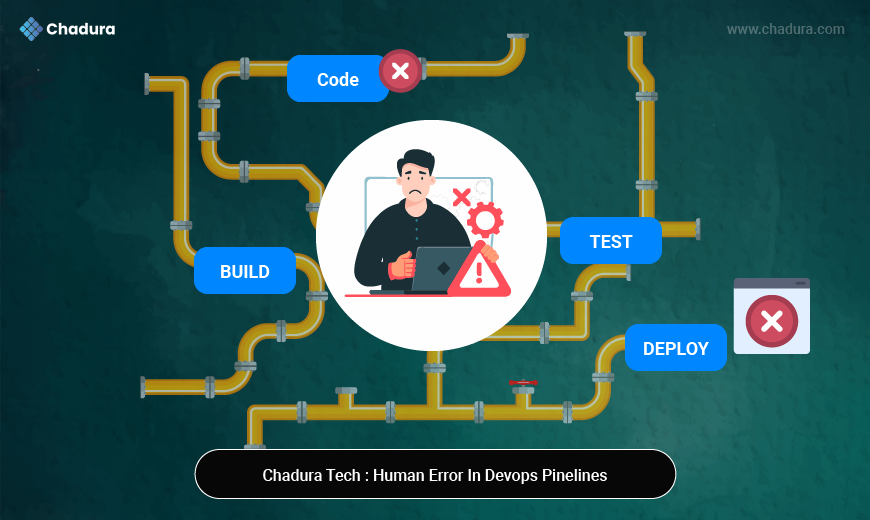
Even the most skilled DevOps engineers can make mistakes under pressure. Some of the most common errors include:
- Incorrect configuration values in YAML or Dockerfiles
- Failure to detect anomalies in system logs before incidents occur
- Missed dependencies or untested code paths during continuous integration
- Delayed responses to infrastructure or application failures
These small errors can lead to significant consequences — downtime, performance degradation, and loss of customer trust.
At Chadura Tech, we have seen that introducing AI-based automation minimizes these risks and enhances the reliability of our CI/CD workflows.
4. The AI Advantage: Where Intelligence Meets Automation
4.1 Automated Code Review
AI-based tools like SonarQube with ML extensions and DeepCode automatically review code and detect vulnerabilities before deployment. They ensure that only secure and optimized code reaches production.
4.2 Predictive Failure Detection
Machine learning algorithms analyze system metrics to predict failures before they occur. Tools such as Datadog AI Ops, Prometheus with anomaly detection, and AWS DevOps Guru detect irregular behavior in system performance, giving teams a head start to fix issues.
4.3 Intelligent CI/CD Optimization
AI can monitor build times, test success rates, and deployment frequencies to identify bottlenecks. For example, AI can suggest optimal build sequences, parallel testing strategies, or even auto-rollbacks when anomalies are detected.
4.4 Automated Incident Management
AI-driven bots and monitoring tools like PagerDuty Intelligent Automation and Opsgenie can automatically categorize, prioritize, and resolve alerts — reducing manual workload for engineers.
4.5 Adaptive Infrastructure Management
AI dynamically adjusts resources based on real-time demand. Through predictive scaling, it ensures applications maintain performance while optimizing cost efficiency on platforms like AWS, Azure, or Kubernetes clusters.
5. Real-World Use Case: Chadura Tech’s AI-Enhanced DevOps
At Chadura Tech, we’ve implemented AI-powered DevOps pipelines for multiple enterprise clients. Here’s how it works in practice:
- Smart CI/CD Pipelines – Integrated with AI-based testing tools that automatically detect flaky tests and rerun them before merging.
- Intelligent Monitoring – Using machine learning to analyze logs and metrics, predicting system overloads or potential downtime.
- Self-Healing Systems – When an issue arises, automated scripts trigger corrective actions, such as restarting containers or reallocating resources.
- AI-Powered Security – Real-time threat detection integrated into the deployment pipeline ensures every release meets compliance standards.
This approach has reduced manual errors by over 70% and deployment times by 40% across several projects.
6. Reducing Human Error: The Core Benefits of AI
AI reduces human error through:
- Consistency: Automated scripts perform repetitive tasks uniformly every time.
- Learning from History: AI learns from previous incidents to prevent similar mistakes.
- Real-Time Feedback: Engineers get instant alerts with root-cause insights.
- Continuous Improvement: Machine learning models evolve with each iteration, enhancing accuracy over time.
By minimizing manual intervention, teams can focus on innovation rather than maintenance.
7. Increasing Efficiency: Accelerating the DevOps Lifecycle
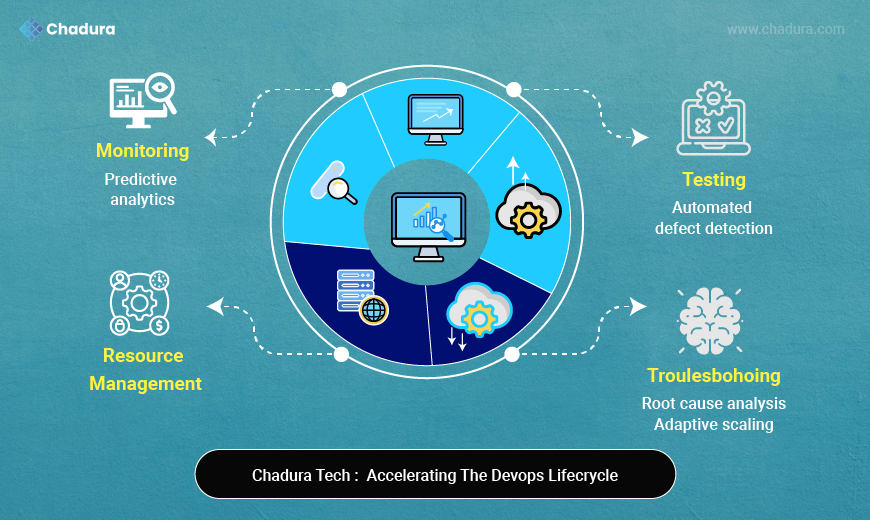
AI not only reduces human error — it also boosts productivity, shortens release cycles, and enhances automation throughout the DevOps workflow. Below are key areas where AI delivers measurable efficiency gains:
1. Monitoring
2. Testing
3. Deployment
4. Troubleshooting
5. Resource Management
8. Tools and Technologies Powering AI-Driven DevOps
Here are some widely adopted tools that bring intelligence into DevOps workflows:
- AWS DevOps Guru – Analyzes operational data and detects anomalies automatically.
- GitHub Copilot & CodeWhisperer – Suggests code improvements and fixes errors in real time.
- Dynatrace & New Relic AI – Provide deep observability and predictive performance insights.
- Splunk Machine Learning Toolkit – Enhances log analysis with data-driven intelligence.
- Jenkins + ML plugins – Automate test pipelines with smart failure detection.
At Chadura Tech, we integrate such tools to build self-sustaining DevOps ecosystems for clients across industries.
9. Challenges and Considerations
While AI brings immense potential, adopting it in DevOps requires careful planning:
- Data Quality: AI models rely on clean and structured data.
- Integration Complexity: Aligning legacy systems with new AI-driven pipelines can be challenging.
- Skill Gaps: Teams need training in ML fundamentals and AI tool usage.
- Security & Compliance: Automated decision-making must align with enterprise policies.
Chadura Tech assists organizations in addressing these challenges through strategic consulting and end-to-end DevOps modernization.
10. The Future: Autonomous DevOps
The ultimate goal is AIOps — where systems self-monitor, self-diagnose, and self-heal without human intervention.
In the near future, AI will:
- Recommend deployment schedules based on traffic predictions
- Automatically tune system performance
- Forecast failures before they happen
- Ensure continuous compliance through adaptive policies
At Chadura Tech, we’re driving toward this vision — creating DevOps systems that are autonomous, intelligent, and reliable.
11. Conclusion: Smarter DevOps with AI
AI is not replacing DevOps engineers; it’s empowering them.By offloading repetitive, error-prone tasks to intelligent systems, professionals can focus on innovation, scalability, and performance optimization.
For organizations aiming to reduce downtime, eliminate errors, and accelerate delivery, integrating AI into DevOps is no longer optional — it’s essential.
At Chadura Tech, we continue to explore, implement, and optimize AI-driven DevOps strategies that redefine efficiency and reliability in software engineering.


